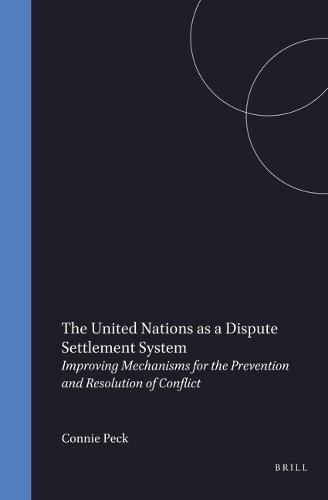Overview
This text reviews the preventive diplomacy of the United Nations, suggesting that the Security Council is not well suited to the task. What is needed, it argues, is a less political and more professional approach, namely a larger (and more autonomous) role for the Secretary-General and the development of a greater specialist capacity within the Secretariat. The work gives appropriate weight to the importance of peace building, both before and after conflict, as an integral part of conflict prevention, and the United Nations' role therein.
Full Product Details
Author: Connie Peck ,
Gareth Evans
Publisher: Kluwer Law International
Imprint: Kluwer Law International
Dimensions:
Width: 16.60cm
, Height: 2.40cm
, Length: 23.00cm
Weight: 0.717kg
ISBN: 9789041102485
ISBN 10: 9041102485
Pages: 316
Publication Date: 01 May 1996
Audience:
College/higher education
,
Professional and scholarly
,
Undergraduate
,
Postgraduate, Research & Scholarly
Format: Hardback
Publisher's Status: Active
Availability: Out of stock

The supplier is temporarily out of stock of this item. It will be ordered for you on backorder and shipped when it becomes available.
Reviews
' In this book, Dr Peck provides a comprehensive review of preventive diplomacy - the mobilisation of diplomatic resources to try and stop disputes from sliding across the threshold into armed conflict. She examines the obstacles to the effective practice of preventive diplomacy in the past, and discusses the various models which have been proposed to overcome those obstacles. Dr Peck also examines the efficacy of the United Nations' machinery in the conduct of preventive diplomacy, and comes up with the telling point that the Security Council is not well suited to the task. What is needed, she argues, is a less political and more professional approach, that is, provision of a larger (and more autonomous) role for the Secretary-General and the development of a greater specialist capacity within the Secretariat. Dr Peck gives appropriate weight to the importance of peace building, both before and after conflict, as an integral part of conflict prevention, and the United Nations' role therein. Her recommendations on the measures that can be undertaken by the United Nations to prevent disputes deserve careful consideration by anyone who cares for the United Nations and believes that, whatever the frustrations that may be encountered from time to time, its role in ensuring peace and security is indispensable.' <br>From the foreword by Gareth Evans, QC, Minister for Foreign Affairs of Australia.
'In this book, Dr Peck provides a comprehensive review of preventive diplomacy - the mobilisation of diplomatic resources to try and stop disputes from sliding across the threshold into armed conflict. She examines the obstacles to the effective practice of preventive diplomacy in the past, and discusses the various models which have been proposed to overcome those obstacles. Dr Peck also examines the efficacy of the United Nations' machinery in the conduct of preventive diplomacy, and comes up with the telling point that the Security Council is not well suited to the task. What is needed, she argues, is a less political and more professional approach, that is, provision of a larger (and more autonomous) role for the Secretary-General and the development of a greater specialist capacity within the Secretariat. Dr Peck gives appropriate weight to the importance of peace building, both before and after conflict, as an integral part of conflict prevention, and the United Nations' role therein. Her recommendations on the measures that can be undertaken by the United Nations to prevent disputes deserve careful consideration by anyone who cares for the United Nations and believes that, whatever the frustrations that may be encountered from time to time, its role in ensuring peace and security is indispensable.' From the foreword by Gareth Evans, QC, Minister for Foreign Affairs of Australia.
'In this book, Dr Peck provides a comprehensive review of preventive diplomacy - the mobilisation of diplomatic resources to try and stop disputes from sliding across the threshold into armed conflict. She examines the obstacles to the effective practice of preventive diplomacy in the past, and discusses the various models which have been proposed to overcome those obstacles. Dr Peck also examines the efficacy of the United Nations' machinery in the conduct of preventive diplomacy, and comes up with the telling point that the Security Council is not well suited to the task. What is needed, she argues, is a less political and more professional approach, that is, provision of a larger (and more autonomous) role for the Secretary-General and the development of a greater specialist capacity within the Secretariat. Dr Peck gives appropriate weight to the importance of peace building, both before and after conflict, as an integral part of conflict prevention, and the United Nations' role therein. Her recommendations on the measures that can be undertaken by the United Nations to prevent disputes deserve careful consideration by anyone who cares for the United Nations and believes that, whatever the frustrations that may be encountered from time to time, its role in ensuring peace and security is indispensable.' From the foreword by Gareth Evans, QC, Minister for Foreign Affairs of Australia.



